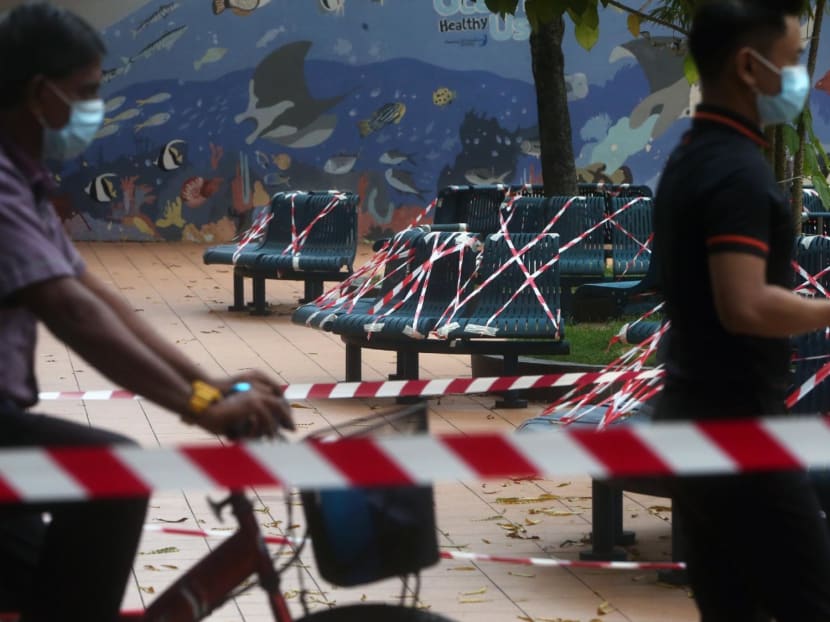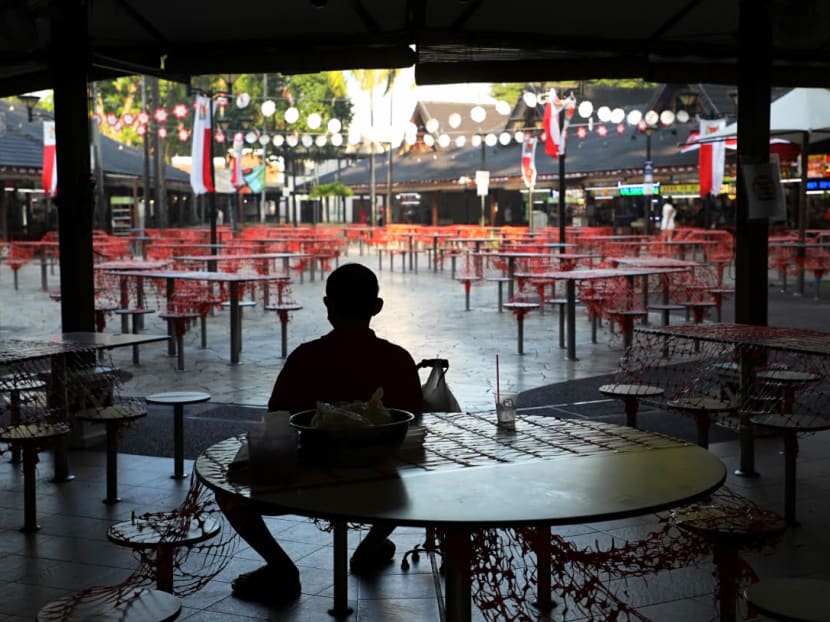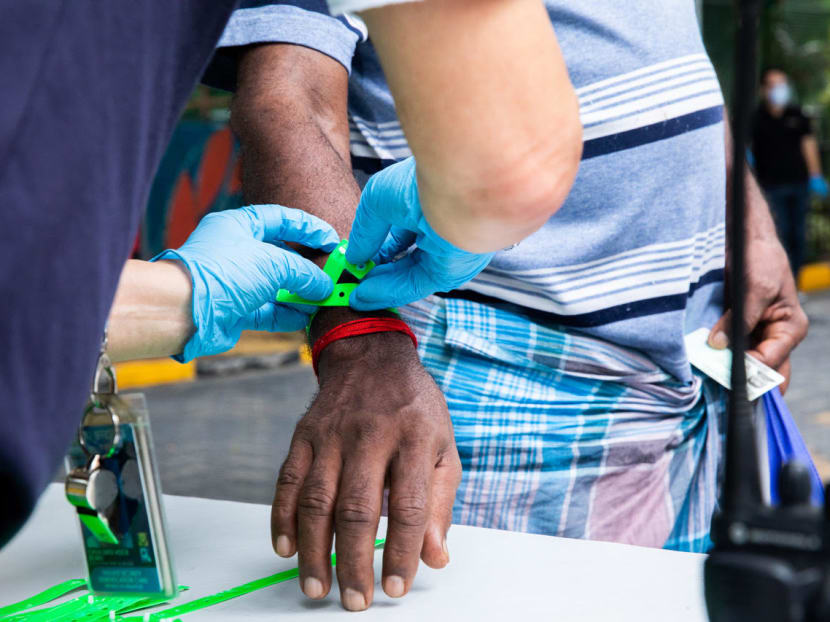Analysis: Government's Covid-19 White Paper 'fair, candid, self-critical', S'poreans will be the best judge
SINGAPORE — The White Paper detailing Singapore’s response to the Covid-19 pandemic was fair and struck a balance being both candid and self-critical, political analysts said. However, the best judgement of the Government and its findings would be whether Singaporeans agree — or disagree — with the after-action review.

Benches at a public housing estate were cordoned off with tape as part of infection controls against Covid-19 during a semi-lockdown in April 2020.
- Analysts described the White Paper on Singapore's response to the Covid-19 pandemic as fair, candid and self-critical
- The best judgement of the Government and its findings would be whether the people agree, or disagree, with the review, one political commentator said
- A migrant workers’ support group and two frontline workers gave their take on the findings
- The analysts gave different opinions on whether the review could have been done externally
- Generally, they believe that the report is unlikely to negatively affect the ruling party at the next General Election
SINGAPORE — The White Paper detailing Singapore’s response to the Covid-19 pandemic was fair and struck a balance being both candid and self-critical, political analysts said.
However, the best judgement of the Government and its findings would be whether Singaporeans agree — or disagree — with the after-action review, one said.
The paper released on Wednesday (March 8) traced how the Covid-19 crisis unfolded since Singapore’s first imported case in January 2020 up to the time the country entered a new normal of living with Covid-19 as an endemic disease such as influenza.
Through internal reviews done by various government agencies and one by former head of civil service Peter Ho, the paper identified key areas in the pandemic response where the Government did well and where it could have done better.
The 92-page paper adopted candid, sometimes blunt language, and also detailed important lessons to be learnt for Singapore to better prepare for future pandemics.
WAS THE GOVERNMENT TRANSPARENT ENOUGH?
Mr Andrew Yeo, the Asia director of Global Counsel, a public policy advisory firm, said that such government reports are premised on a “need-to-know basis”.
This is especially when the subject of the report “could involve matters as emotionally and politically evocative as choosing who to prioritise in a pandemic situation”.
For example, the United Kingdom’s health authority has appealed against an order by the country’s Information Commissioner’s Office to publish its after-action review, Mr Yeo noted.
“In this regard, I think what was published (in the White Paper) was fair and struck an appropriate tone of being both candid and self-critical,” he added.
Mr Yeo’s views were shared by other analysts who spoke to TODAY and who applauded the review.
Mr Samir Bedi, the government and public sector leader at advisory and accounting firm EY, said that the findings in the White Paper showed that the Government had “a clear desire to be transparent about the process”.
However, the Government still has more to do, he added. This includes contextualising the findings into “actionable steps” that it can focus on when dealing with the next crisis or pandemic.
“Now that we are in an endemic phase, it is opportune to explore how to take these new learnings and translate them into actions and considerations,” Mr Samir said.
And this is only possible with the Government voicing out what it could have done better, another analyst said.
Dr Felix Tan from the Nanyang Technological University (NTU), whose research interests cover Southeast Asian politics, said: “By listing it out, by saying it point blank, I think it allows Singaporeans to say that, ‘Yes, the Government's admitting there were difficulties, there were situations that we did not manage well. In moving ahead, what else can be done?’.”
“Any Member of Parliament speaking in the debate later this month must give credit where it is due and offer constructive feedback on what the Government could have done better.Associate Professor Eugene Tan, a former Nominated Member of Parliament, giving his view on the Covid-19 White Paper”
Associate Professor Eugene Tan, a law lecturer from the Singapore Management University (SMU) who was a former Nominated Member of Parliament, said that with the White Paper set to be debated in Parliament later this month, it shows the Government’s willingness to learn from its pandemic response, to subject its record to “close scrutiny”.
“The Government is confident that its overall response would earn kudos from Singaporeans and other stakeholders,” he said.
“In any case, any thorough review would be grossly inadequate if it only dwelt on the positives or the negatives. Any Member of Parliament speaking in the debate later this month must give credit where it is due and offer constructive feedback on what the Government could have done better.”
He added that Singaporeans must take the review in “the right spirit”, that the Government could not have dealt with the pandemic alone because it required a collective and cohesive response.
“We cannot expect a perfect governmental response to the pandemic. A better measure is how quickly the Government adapted to the ever-evolving scenarios and uncertainties. On that score, I would say the Government has done relatively well.”
Assoc Prof Tan also said: "In my view, the White Paper reflects a relatively high level of transparency and honest self-judgement.
"The findings are in the ballpark and I don’t see the Government shying away from things that did not go so well such as handling the migrant worker dormitories and the U-turn on the mask mandate, for example.”
COULD THE REVIEW HAVE BEEN DONE EXTERNALLY?
However, the analysts had mixed thoughts about the after-action review that was spearheaded by former head of civil service Peter Ho and done by various government agencies.
Assoc Prof Tan from SMU said that Mr Ho has retired from the civil service, “is his own man and can be counted on to give a fair appraisal”.
Noting that the review was not meant to sing praises or purely criticise the Government, Assoc Prof Tan said: “As a former head of the civil service, Mr Ho would be familiar with the workings of the civil service, what it can and cannot do.
“An external review would cost far more and will take a much longer time without more benefits necessarily accruing.”
On the other hand, Dr Tan from NTU said that an external review would have provided for a “more balanced assessment of the Government’s efforts during the pandemic”.
“However, one can see this as a first step of a crisis assessment and the Government would want to be seen to be accountable in providing an overall internal assessment of its own efforts.”
Ultimately, Singaporeans' agreement, or disagreement, with the review would be the best judgement of the Government and the paper’s findings, he added.

WILL THE RULING PARTY LOSE POINTS WITH VOTERS AT NEXT ELECTION?
Even though the White Paper may be candid in listing flaws in the Government’s Covid-19 response, the analysts said that it will unlikely have a negative impact on the ruling People’s Action Party (PAP) during the next General Election.
Rather, they foresee the political impact being largely positive.
Assoc Prof Tan said: “We can expect some nit-picking to take place during the parliamentary debate and during the election campaign hustings.
“But I don’t see the Government’s response attracting any significant recriminations at the polls or on the multi-ministerial task force co-led by Deputy Prime Minister Lawrence Wong.
“Some criticisms might resonate in some quarters but I don’t expect the White Paper and the debate to move the needle on how Singaporeans view the Government’s response.”
Mr Yeo of Global Counsel said: “Singapore’s handling of the pandemic has drawn widespread praise and I doubt the reflections in the White Paper, even if used as political fodder by the Government’s critics, will pass muster among the wider electorate.”
Dr Tan further noted that during the pandemic, there were many uncertainties that raised questions about the Government’s decisions. This included holding the 2020 General Election in the middle of the Covid-19 pandemic.
“So with this report itself, it will put the PAP in a better light in the next election because now you have a report card that shows that the PAP has done a very good job.”
Beyond that, Dr Tan also noted that the White Paper showcased how Mr Wong had done a “good job" in leading the national Covid-19 task force, putting him in a good light.
WHAT DO OTHER PEOPLE SAY OF THE REPORT?
The plight of migrant workers during the Covid-19 crisis here must not be forgotten in reflecting on what has happened in the past three years, Mr Alex Au said.
He is the vice-president of migrant workers' rights group Transient Workers Count Too, one of the non-governmental organisations that had sounded the alarm about a possible outbreak in workers' dormitories in early 2020.
“I think it was symptomatic of the way of life in Singapore, that we seldom have migrant workers at the forefront of our thoughts, that the spread of the virus in the dorms came as an unexpected surprise,” Mr Au added.
“It fell out of everybody’s thoughts that there are hundreds of thousands people crowded in dormitories, so that is a good lesson to learn.”
The White Paper said that the situation at these dormitories was “a crisis within a crisis” and the Government could have done better in handling it, noting that the earlier precautions carried out were not enough.
Now that Singapore is living with Covid-19 as an endemic disease, Mr Au said that the various problems that migrant workers still face must not be forgotten.
This includes the debt they have to incur to get a job in Singapore, the lack of recourse in recovering unpaid wages, and being open to exploitation when they are unable to find another job here should they be fired.
“The danger is (that) we spend too much time congratulating ourselves on our approach to Covid-19 that we forget that there are all these other problems still waiting to be solved. It’s not so much welfare but justice,” Mr Au added.

Reflecting on their experiences during the pandemic, two frontline workers told TODAY that mask-wearing was a contentious issue and should be a lesson for the authorities.
Dr Sunil Kumar Joseph, a general practitioner who runs Tayka Medical Family Clinic in Jurong, said: “As healthcare professionals, we knew from the start that mask-wearing was important.
“When people came into our clinic and they were coughing, we instinctively knew that this physical barrier will be good and we wanted the patients to wear masks.
“The evidence was not there at the start but if you don't have data because data takes time to accumulate, sometimes you just have to make the decision.
“I understand that it’s a big, difficult decision to implement mask-wearing nationwide, but I think this is when the Government needs to trust and listen to those on the ground.”
Ms Norshinta Mansoor, 41, a clinical assistant and trained nurse with Healthmark Medical Clinic in Punggol, said that many changes during the pandemic were introduced “very fast”.
“The changes were quite drastic and we always had to keep up.
“I think one thing that could have been done better was to give some time for transitions, so that people can absorb them and adapt,” she said, adding that frontline workers also needed time to mentally prepare for such shifts.
This included mask-wearing and isolation rules.
However, both Dr Sunil Kumar and Ms Norshinta largely agreed with the findings of the White Paper and recognised that Singapore had performed well in some areas — such as in providing subsidies for Covid-19 treatment and absorbing the cost of coronavirus testing.
“I think if it had not been for the low cost of treatments and free testing, people would not have come forward to get themselves tested and treated… and we would have more people unknowingly spreading the virus,” Ms Norshinta said.















